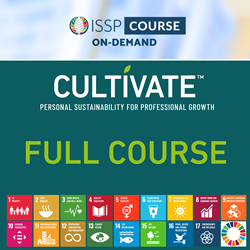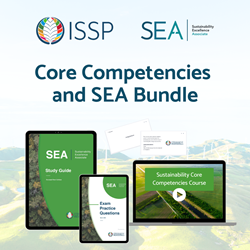Sustainability Core Competencies Course - Middle Emerging Economy
On-Demand Courses
About the course
The Sustainability Core Competencies course provides a foundational understanding of sustainability concepts and best practices. Participants will explore sustainability trends, history, frameworks, business benefits, global institutions, policy, and tools to give them an overview of the profession and context for their projects moving forward.
The content of this course is based on the SEA Study Guide and can be used as preparation for the SEA exam. This course is a tool to help you study for the exam, but completion of the Sustainability Core Competencies course does not guarantee passing the SEA exam. Your success in attaining the credential depends entirely upon the time you devote to learning the information detailed in the study materials, as well as knowledge and skills learned through formal education and life experiences.
This course module is presented in 10 modules, approximately 10 hours:
-
Issues, Trends, Impacts, and Perspectives - This module provides an overview of sustainability and some of the most pressing social, environmental, and economic sustainability issues. The first half of this module reviews key terms and concepts; the remainder covers key social, environmental, and economic issues.
-
Social Justice, Impact, and Responsibility - This module looks at how three concepts of social sustainability (basic human needs, equity, and human rights) apply to a variety of stakeholder groups.
-
Frameworks and Principles - This module explains key sustainability frameworks and principles, which guide the ways economic and social activity can fit within a sustainable global environmental system.
-
Systems Thinking and Interdependencies - This module explains systems thinking, explores its structure, and provides examples of interdependencies in nature that require this problem-solving approach.
-
Business Case for Sustainability Practices - This module provides an overview of the business benefits that justify our proposed sustainability initiatives. You will learn how to identify, quantify, monetize, and communicate the business-related benefits of environmentally or socially beneficial projects.
-
History of Sustainability - This module provides a history of the sustainability field and commonly used language to help others understand what sustainability means and to advance the most effective sustainability practices. In addition, students will learn the history of how society’s practices became unsustainable and the movement to change that trajectory.
-
Global Institutions and Initiatives - This module provides a sampling of the many organizations working on sustainability issues around the world, with a focus on the longest-running and most enduring institutions and conventions.
-
Regulations and Policy - This module provides an overview of the most used government regulations and policies that address sustainability challenges on a variety of levels, from seeking to influence individual behavior to creating mechanisms and agreements governing national and global practices.
-
Standards, Protocols, and Certifications - This module provides an overview of various standards and certifications that shape sustainable practices related to accounting, measuring, and reporting.
-
Tools and Technology - This module presents the sustainability tools that enterprises generally employ for analyzing and implementing resource and water efficiency, renewable energy, land management, and other initiatives.
Course participants will take one quiz at the end of each module, approximately 10 questions each, for a total of 100 questions at the end of the course.
Following the successful completion of the course, students will receive a Certificate of Completion, indicating knowledge of core sustainability concepts and best practices.
The completion of the full Sustainability Core Competencies course earns 5 Continuing Education Units (CEU) for SEA and SEP credential holders.
ISSP is not able to offer refunds once you have purchased access to your course, resource, or membership for any reason, including change of personal financial standing, health, or inability to access to our site. If you are dissatisfied with your purchase or are otherwise unable to access your purchased product/service in its entirety, you may read our FAQs or reach out to technical support.
When purchasing a product/service from ISSP, you agree and understand that changing your mind about the product/service, failing to follow through or understand the details of the purchase, not experiencing the results expected or desired, or experiencing any other similar situations does not entitle you to a refund.




